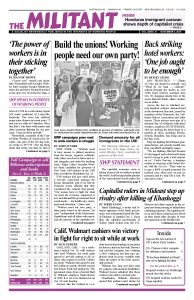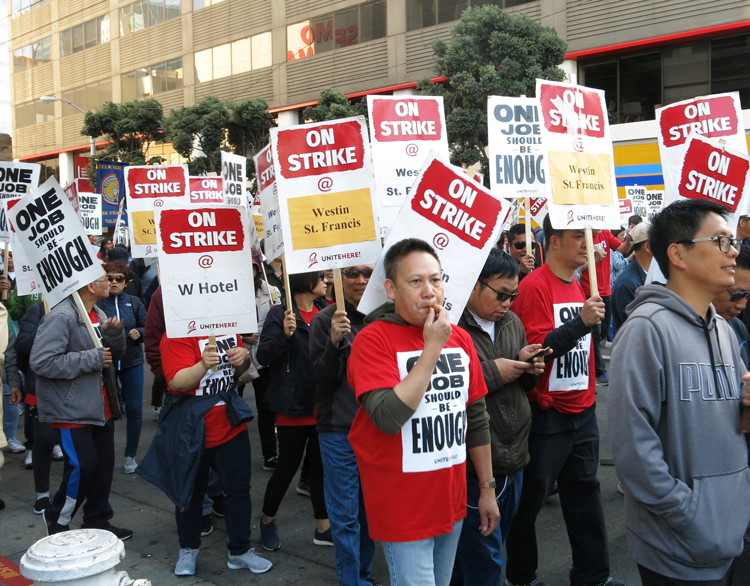SAN FRANCISCO — Chants of “One job should be enough” and “What do we want — contract!” echoed through the streets as over 1,000 hotel workers marched here Oct. 20, stopping outside four of the seven Marriott hotels where workers are on strike.
Across the bay in Oakland several hundred workers demonstrated at the downtown Marriott, joined by members of the Teamsters, the California Nurses Association and other unions. These actions were part of a national day of solidarity with hotel workers, members of UNITE HERE, who are striking the hotel chain in a number of cities, including Boston, Detroit, Honolulu, San Diego and in the Bay Area.
They are fighting for full-time guaranteed hours, job security, health care they can afford and higher wages.
“We are fighting Marriott because it’s the biggest and richest hotel chain and it’s trying to push a bad contract on us,” Carlos Narvaez, a longtime worker in receiving at the Palace Hotel, told the Militant. “They want us to pay a $300 a month premium for medical care, when now we pay no premium and it’s only $10 a visit. We also need a raise.”
The Bay Area strikers’ slogan, “One job should be enough,” is popular. Many work two, even three, jobs to keep up with rising prices and skyrocketing rents in the area.
“Thank goodness I don’t have a high mortgage, but many workers picketing here are paying $2,500 and more for rent,” said Butch Avino, who has worked as a doorman for 35 years at the Marriott on Union Square. “Wages have to go up.”
Yao Lee, a cook on strike at the Oakland Marriott, works three jobs. He said he’s outraged at the company demand that workers pay more for medical care. “We can win,” he said. “We need it!”
Room cleaners face job cuts and speedup, due in part to Marriott’s “Green Choice” program that offers incentives to guests to clean their own rooms. While it takes longer to clean rooms that have not been serviced for several days, the company is demanding that workers clean more rooms per shift than before.
After over two weeks on strike, picket lines at the hotel entrances have stayed strong and loud. Workers keep up ceaseless drumming and horn and whistle blowing, and chanting of “Don’t check in! Check out!” Many drivers going by honk in support.
Despite working two jobs, David Lule, a cook at the Omni Hotel, finds time to join the picket line at the Palace in solidarity with workers there. A 17-year veteran of union struggles, he is one of many union members who remember past hotel workers’ battles that won gains in pay and benefits.
While picketing at the Oakland Marriott, housekeeper Jackeline Gonzalez compared the $17 an hour she gets with the lower wages she made at a nonunion hotel in nearby Lafayette. “You can see the difference with a union,” she said.
Supporters from all over the northeast — from Rhode Island to Maryland — joined striking workers from seven Boston-area Marriott hotels in an Oct. 20 rally there organized by UNITE HERE Local 26.
“Ninety workers from the hotel where I work came to the rally today,” Josefina Perez, an 18-year veteran at Marriott, told the Militant. “That makes me more confident. I know we’ll win.”
At the same time, in Chicago, members of UNITE HERE Local 1 at 25 of the 26 hotels that went on strike Sept. 7 have won new contracts that give them year-round health care, their central demand.
“There is only one hotel still on strike and that’s the Cambria Hotel Chicago Magnificent Mile,” said Demechio Brown, who was a strike leader at the Hyatt Regency where workers settled. “It’s a small hotel with only 58 union members, so the owner is holding out trying to run the hotel with management and temp workers.”
Sam Hamlin and Ellen Brickley from Albany, New York, and Dan Fein from Chicago contributed to this article.


